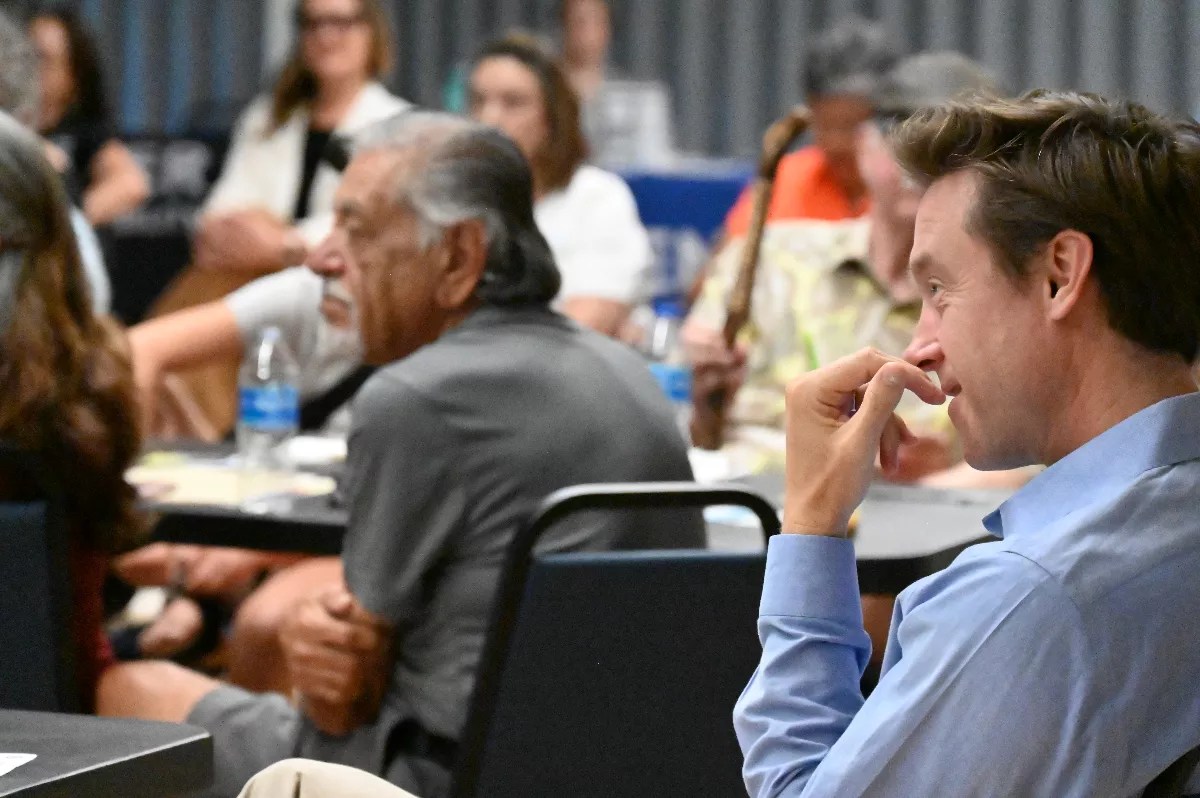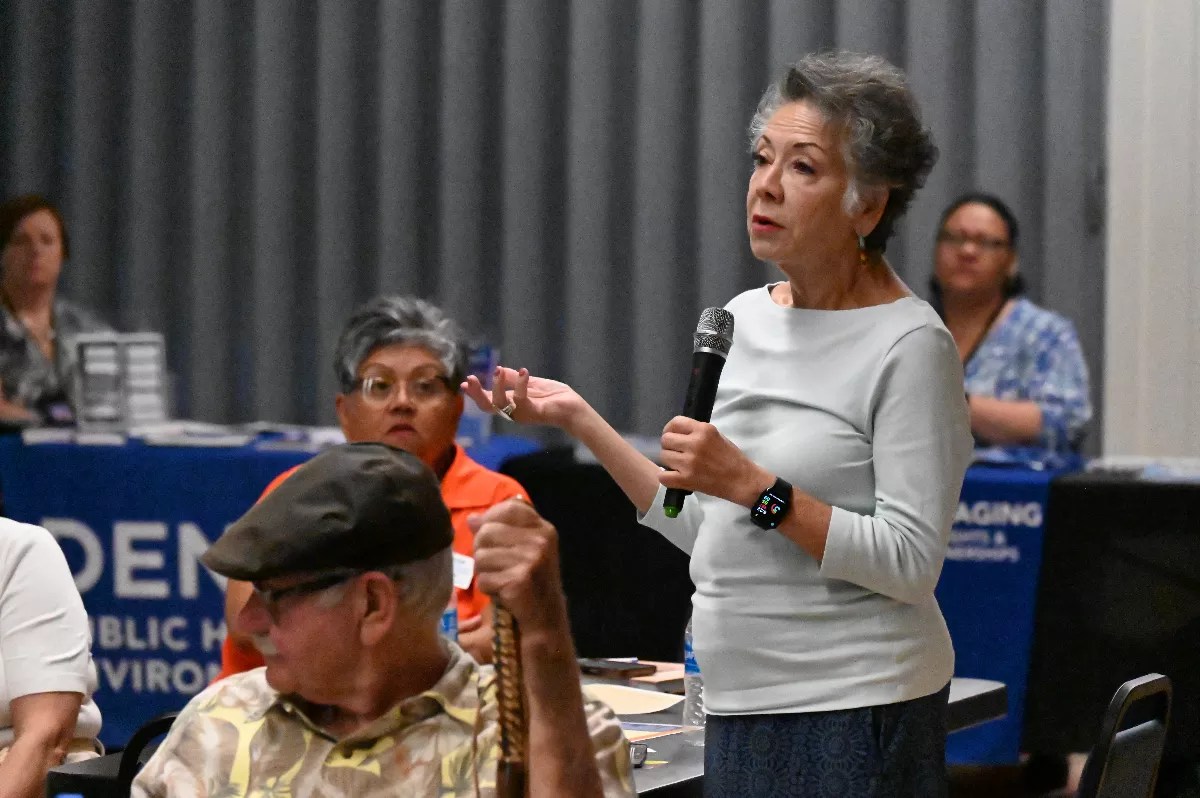
Bennito L. Kelty

Audio By Carbonatix
North Denver residents told Mayor Mike Johnston during his latest town hall on affordability on Thursday, August 15, that red tape and high fees are making it difficult to build accessory dwelling units (ADU) on their property to combat displacement from rising rents and home prices.
The City of Denver describes ADUs as “self-contained, smaller living spaces that are an extension of an existing property.”
Also called “mother-in-law suites” or “granny flats” because they offer a way for multiple generations to live on a single property, an ADU “has its own kitchen, bath and sleeping area, but is not considered a separate property that could be sold on its own,” according to the city. “They can be built as a free-standing structure in the backyard, could be built above a garage, could be an addition built onto the main home, or could be a converted space within the main home, such as an attic or a basement.”
For aging family members who want to pass on their Denver properties to their kids, ADUs can be cheap alternatives to renting apartments or buying a house. They can also offer homeowners an extra income by renting them out.
Nita Gonzales, the oldest daughter of iconic Denver Chicano activist Rodolfo “Corky” Gonzales and an outspoken critic herself, attended the meeting as a Chaffee Park resident.
Gonzales told Mayor Johnston that she has been building an ADU for a year and a half, and it will be the only thing that keeps her in Denver. But the incomplete endeavor has been too expensive so far, and the city needs to pour more resources into helping residents through the process, she said.
“It is very difficult for me to get the refinancing to build an ADU that me and my husband will age in place in so that my daughter, who’s a teacher, can live in my house,” Gonzales says. “That’s what we would like to do. That’s how we’re going to afford to stay in Denver.”
She concluded by telling Johnston, “You’d better figure out how to use your bully pulpit to bring those finances to the table.”
The town hall, held at the Scheitler Recreation Center, was for City Council District 1, covering northside neighborhoods like Highland, Sloan’s Lake, Sunnyside and Berkeley.
Like most of the forty residents who attended Thursday’s town hall, West Highland resident Shawn Johnson showed up to ask the mayor to eliminate red tape and costs that come with permitting for ADUs, he tells Westword. Johnson nearly finished building an ADU for his mother, but he can’t get an occupancy permit because city right-of-way laws require him to reshape his driveway and create a new curb, which will cost him thousands, he says.
“That project is almost $10,000, and that directly affects our affordability,” Johnson says. “It’s a very cosmetic issue that we’re caught up in.”

Nita Gonzales, daughter of late Chicano activist Corky Gonzales, said she’s been trying to build an ADU but can’t get around financing to finish it, telling Mayor Johnston, “You’d better figure out how to use your bully pulpit to bring those finances to the table.”
Bennito L. Kelty
At previous town halls, Johnston told residents that Denver City Council will revisit a proposal to zone the entire city in a way that creates a simpler, cheaper and uniform ADU process; currently, the city has a patchwork of different zoning codes for ADUs. The mayor also promised a “Sears catalogue” of city-approved ADU models for residents to choose from.
He hasn’t brought those ideas back up at his last couple of meetings, however, and the council hasn’t done anything with the proposed rezoning for ADUs since it was presented to the Budget & Policy committee in March.
Johnston responded to Gonzales by telling her that he would finance more ADU construction with revenue from his proposed half-cent sales tax known as “Affordable Denver.” The sales tax still needs to get approval from the city council on Monday, August 19, to go on the November ballot; then it will need voter approval.
The Affordable Denver sales tax would raise $100 million a year to build 44,000 cost-controlled housing units, including 5,000 in the first year, by taxing everything except gas, groceries and hygiene products, among other exempt items, according to Johnston. The mayor has been stumping for the proposed ballot measure at all of his town halls on affordability, and promises it will only cost Denver families an average $2 extra per week.
Gonzales tells Westword she’s “not ready to vote yes” on the Affordable Denver tax and wants to see “very specific guardrails to be able to ensure that diverse levels of income” are served by housing Johnston wants to build with the tax.
Councilmembers have voiced the same concerns, and the mayor’s office compromised by specifying in the ballot proposal that the tax revenue would build housing for families making 100 percent of the area median income (AMI) or less. Currently, a family would need to make $117,000 a year to be below that level of AMI, a federal metric changed annually to reflect average incomes in an area.
ADU permitting and costs were the most common concern at the meeting on Thursday, but residents also had stories of neighbors and friends being displaced by rising rents and home prices in the area.
“House and apartment sharing is more common,” a Sloan’s Lake resident said. “Friends have had to move out of Denver because they couldn’t afford it anymore. Virtually everyone [I spoke to today] who owns housing in Denver got in decades ago.”
One resident said that northwest Denver has “a lot of seniors who eventually pass away, and then their children are unable to afford to live in the homes they grew up in, which causes them to sell off the home…unfortunately, to developers who end up flipping the home.”
Another resident of north Denver for twenty years said that if Denver remains unaffordable, then government services will take a hit.
“City employees, federal employees do not make enough money to buy a million-dollar home to live in this city,” the resident said. “That is going to affect the ability of the city to hire people who live in the city, [and] for me, as a federal employee who hires people, to hire people into positions in this community.”
Six residents read aloud affordability concerns shared in their respective breakout groups at the meeting. All of them said they or someone else in their group is worried about being pushed out of their neighborhood by the high cost of living, and all groups concluded that ADUs were the best solution.
The town hall was part of Johnston’s Community Conversations, which he promised as part of his Citywide Goals 2024. The next one on affordability will be for City Council District 3, which covers West Denver neighborhoods like West Colfax, Sun Valley and La Alma; the meeting will take place on Wednesday, August 21, from 5:30 to 7 p.m. at the Westwood Community Center, 1000 South Lowell Boulevard. More town halls with Johnston and city council members can be found on the mayor’s online community outreach calendar.